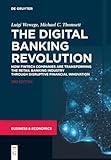The Digital Banking Revolution : How Fintech Companies are Transforming the Retail Banking Industry Through Disruptive Financial Innovation / Luigi Wewege, Michael C. Thomsett.
Material type: TextPublisher: Berlin ; Boston : De Gruyter, [2019]Copyright date: ©2020Edition: 3rd EditionDescription: 1 online resource (XVI, 122 p.)Content type:
TextPublisher: Berlin ; Boston : De Gruyter, [2019]Copyright date: ©2020Edition: 3rd EditionDescription: 1 online resource (XVI, 122 p.)Content type: - 9781547418336
- 9781547401611
- 9781547401598
- online - DeGruyter
| Item type | Current library | Call number | URL | Status | Notes | Barcode | |
|---|---|---|---|---|---|---|---|
 eBook
eBook
|
Biblioteca "Angelicum" Pont. Univ. S.Tommaso d'Aquino Nuvola online | online - DeGruyter (Browse shelf(Opens below)) | Online access | Not for loan (Accesso limitato) | Accesso per gli utenti autorizzati / Access for authorized users | (dgr)9781547401598 |
Frontmatter -- Praise for the Book -- Foreword -- Contents -- About the Authors -- Chapter 1. Introduction -- Chapter 2. Overview of Banking -- Chapter 3. An Imperfect System: Financial Crises -- Chapter 4. Rapid Transformation -- Chapter 5. The Financial Disruptors -- Chapter 6. The Digital Financial Revolution -- Chapter 7. A New Era of Banking -- Chapter 8. International Financial Innovations -- Chapter 9. A Digital Blueprint for Banks -- Chapter 10. Human Resources in the Digital Era -- Chapter 11. The Future of Banking -- List of Sources -- Thank you -- Index
restricted access online access with authorization star
http://purl.org/coar/access_right/c_16ec
Emergent innovative financial technologies are profoundly changing the way in which we spend, move and manage our money, unlike ever before, and traditional retail banks are facing stiff competition. The global financial crisis in 2007–2009 led to large losses, and even the collapse of a significant number of established banks shaking the trust of financial customers worldwide. The Digital Banking Revolution is an insightful look at how financial technology and the rapid rise of financial technology companies have brought welcome changes offering flexibility to the banking industry. The book offers a unique perspective on the consumerization of retail banking services. It delves into the many changes that financial innovations have brought about in banking, the main financial disruptors, the new era of "banking on the go," and financial innovations from countries around the world before concluding with a discussion on the future of banking including optimizing structures, new strategies for business outcomes, and human resources in the digital era.
Mode of access: Internet via World Wide Web.
In English.
Description based on online resource; title from PDF title page (publisher's Web site, viewed 30. Aug 2021)


